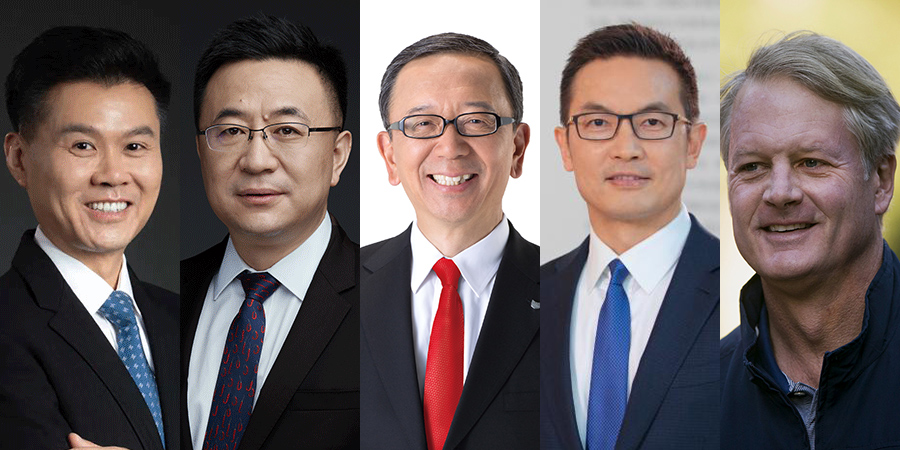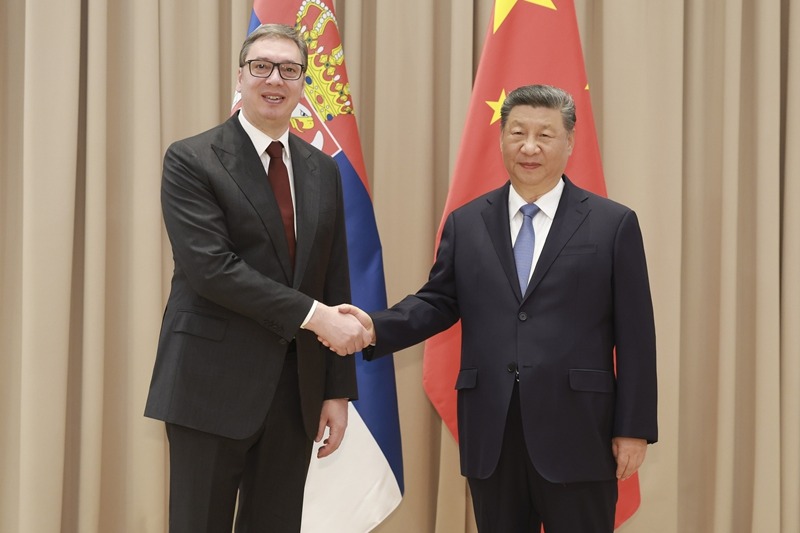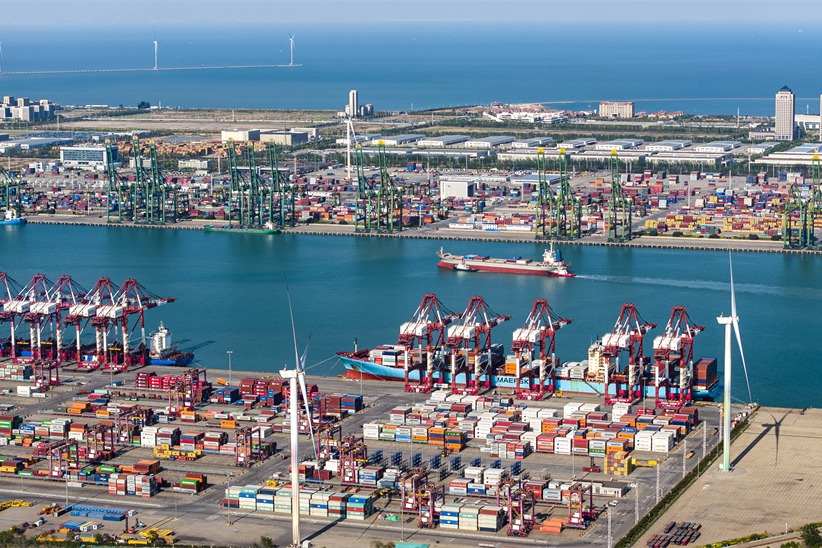China has ample policy tools to beat downturn


Editor's note: With strong policy support, unremitting technological innovation and industrial upgrading, China's economic recovery continued to gather steam in the third quarter, with its GDP expanding by 4.9 percent from a year earlier, leading to a 5.2-percent year-on-year growth in the first three quarters. China Daily presents a series of Q&As with top multinational corporation executives, discussing their perspectives on the Chinese economy and how they will position future business in China.
Q1 Given the complex current global economic and geopolitical situations, how do you position the Chinese market in your overall global business radar? What's your outlook for China's economy and your company's operations in the country for this year and next?
CHEN: Although the global economy still faces uncertainties, with China's high-quality development entering a new stage, I believe the Chinese economy will make steady progress throughout 2023. Chinese enterprises will continue to play important roles in the global supply and value chains. Apart from its colossal market size, China possesses a complete and diverse industrial chain, as well as a highly skilled workforce. Hence, the Chinese economy exhibits remarkable resilience. As China continues to expand domestic consumption, accelerate industrial upgrading, and promote high-level opening-up, I believe that China has ample policy space to counter economic downturn pressures and explore new growth opportunities in sectors such as new energy, artificial intelligence and green low-carbon industries. We will continue to work alongside our Chinese partners and clients to address their needs and help them solve their most critical challenges.
DONAHOE: China not only remains a significant manufacturing and export base, but also serves as a crucial market and (is at the) forefront of innovation for Nike globally. China is the second-largest market by country for Nike and continues to be a very important market for us. We are proud of our 42 years of business and partnership in China, deeply rooted in the market and growing together with the country's sports industry as a brand of China and for China. We believe in the fundamentals of China and that China is a strong market. As we look forward, we are confident in our market position, the strength of our consumer connections and Nike's ability to drive sustainable, long-term growth in China.
FANG: China maintains leadership in 5G, in both the number of 5G base stations and 5G subscriptions, and the industry is highly active in innovations involving 5G technology. As a leading company in 5G technology, Ericsson has always considered China as pivotal. This is not only due to its commercial potential, but also because many of the 5G technologies and applications developed here serve as a model for the rest of the world. These advancements offer valuable insights as we work toward establishing high-quality 5G networks on a global scale. Ericsson will continue its collaboration with service providers and other stakeholders in China to build high-performance, sustainable, intelligent and efficient 5G networks. These networks will support the digital transformation of various industries, drive the monetization of 5G investments, fuel the next wave of 5G technology advancement, and contribute to 6G technology research and development.
OZAWA: The Chinese economy is very resilient, and Canon remains confident in the prospects of China's economic growth. China serves as Canon's most important market, and we have set the goal of making Canon China No 1 in terms of sales within the whole group by 2035.
SONG: The Chinese market is increasingly becoming an important growth engine and innovation hub in Johnson & Johnson's global business portfolio. Johnson & Johnson's long-term commitment to the Chinese market remains unchanged. We continue to invest in innovation to lead and support the high-quality development of the healthcare industry. We are pleased to see that China strives to create a first-class business environment that is market-oriented, based on rule of law and internationalized, making greater efforts to attract foreign investment, and continuing to promote high-standard opening-up. We look forward to working with all partners to accelerate the introduction of more world-leading innovative med-tech products and drugs into China, and continuously improve their accessibility and affordability, so as to better meet the rising healthcare needs of the people and promote the high-quality development of the health industry.
Q2 China's economic policymakers have assured greater efforts to attract foreign capital, widen market access and ensure a level playing field for both domestic and foreign companies. In this context, what new policy measures do you expect from Chinese authorities in the near future?
CHEN: In recent years, China has maintained a system of pre-entry national treatment plus negative list management for foreign investment, leading to the steady improvement of its business environment. In a recent meeting with US Commerce Secretary Gina Raimondo in Beijing, Chinese Premier Li Qiang reiterated China's efforts to provide a world-class, market-oriented business environment governed by a sound legal framework, with a few dozen specific measures coming into force. I think this is a clear signal of a high-standard opening-up and a continuously improving business environment. Sustaining such openness is a win-win for homegrown companies and MNCs. Looking ahead, we believe that China will work on creating a fairer and more transparent business environment in which both Chinese and multinational companies can engage in healthy market competition.
DONAHOE: China is leading a health movement while going green at full speed. Echoing China's "double reduction" and "dual carbon" policies, Nike will keep helping more kids get active and inspiring the love of sports, while prioritizing sustainable innovation and green development as one of our most important strategic directions in China. The sports industry continues to grow in China, and we are looking at a stable and fair business environment supported by the deepening of reform and opening-up in China. Looking to the future, we are very confident about our brands and our business in China.
FANG: Recently, the State Council of China released a document outlining opinions on further optimizing the foreign investment environment and increasing foreign investment. This document provides policy directions across multiple fronts, such as enhancing the quality of foreign investment utilization, ensuring equal treatment for foreign-invested enterprises, and continuous strengthening of foreign investment security. I believe these policies have a positive impact on attracting foreign capital, streamlining the operations of foreign businesses in China, and safeguarding the legitimate rights and interests of foreign companies. I anticipate the continued implementation and improvement of these policies will lead to the establishment of a more stable, transparent and predictable legal and policy environment. This development will greatly benefit foreign enterprises as they seek to integrate more extensively into the Chinese market.
OZAWA: China continuously strives to strengthen its scope of opening-up to the outside world while promoting high-quality economic development and formulating policies to attract investment. These efforts ensure that both foreign and domestic enterprises benefit from a fair, just, open and convenient business environment in the country. China's business environment holds a leading position globally, providing favorable foundations for enterprises to survive and develop, which gives us confidence in the Chinese market. Canon hopes the Chinese government will further roll out measures to boost personal consumption-related economic activities, including introducing tax incentives, to foster a more favorable investment and business environment for overseas investors.
SONG: We are pleased to see that the Chinese government has put forward great efforts to optimize the business environment, continuously emphasizing the importance of innovation-driven high-quality development. From an accelerated review and approval process for innovative drugs and medical products, to free trade and pilot zones across the nation, we continue to work with all stakeholders to bring about the most innovative healthcare products to serve Chinese patients. We believe that China's high-quality economic development will bring multifaceted opportunities for multinational enterprises, and we look forward to China's further opening-up and continuous emphasis and recognition of innovation value, so as to help improve accessibility and affordability of the world's leading innovative drugs and medical products to address unmet healthcare needs in the market.
Q3 As China continues to pursue high-quality development through a homegrown path to modernization, what is the vision for your company's business in the country over the long run? What business opportunities do you foresee emerging as part of the process of Chinese modernization?
CHEN: Globally, technology has become the fundamental source of competitive advantage, and companies need digital transformation to stay competitive. China boasts a vibrant digital economy, and since the 1980s, IBM has participated extensively and deeply in China's informatization journey. We value these long-term partnerships and IBM is committed to contributing to China's ongoing growth.
Specifically, we will focus on contributing to the high-quality development of China's financial industry. IBM's mainframes have led the modernization of the global banking system for decades, delivering critical and cutting-edge technological innovations to clients in need. The introduction of IBM's technology aligns with the needs of China's financial market, which has not only helped the country's banking industry integrate with the world's in just a dozen years, but also made it a world-leading system architecture in certain areas.
We will also continue to provide reliable technical and consulting services for our Chinese financial clients and empower the digital transformation of privately owned enterprises. As high-quality growth and sustainable development have become a must, many private enterprises are facing new challenges in their overseas business, data governance, security compliance and more, which made them pay more attention to cost-effectiveness, flexibility and scalability of their IT infrastructure. IBM's hybrid cloud and artificial intelligence solutions can help them embrace innovation at speed without rebuilding everything.
DONAHOE: China remains a priority for Nike, now and in the long run. Nike is deeply committed to investing and growing with China and is optimistic about its long-term potential. I was in Shanghai and Beijing in early June. It was so energizing to see Chinese consumers back on the streets with vitality and vibrancy. I was blown away by how the entire marketplace experience comes to life there.
As China is ahead of the rest of the world in embracing digital social commerce, we will continue to enhance our digital capabilities and work with our strategic partners in China to build the most integrated marketplace and further expand our competitive separation in the market. China favors high-level environmental protection in its pursuit of high-quality development. At Nike, we are deeply committed to our "net zero" goals and will continue to invest in sustainable innovation and further integrate sustainability into every aspect of our business in China.
FANG: The modernization of China cannot be separated from the modernization of the telecommunications industry, which relies on advanced 5G infrastructure and a thriving ecosystem of 5G innovation and applications. As one of the pillars of new infrastructure, 5G technology plays a pivotal role in supporting China's unique approach to modernization. With China's rapid 5G development and its deepening integration into various industries, Ericsson is committed to furthering our involvement in China's 5G infrastructure construction and application. We aim to actively introduce international advanced technologies and best practices, foster ongoing collaboration with telecom operators to establish a global top-tier 5G network, and facilitate the transition of innovative 5G applications from limited "showcase" deployments to widespread adoption. Simultaneously, Ericsson plans to share China's successful 5G deployment experiences with the rest of the world. From a business perspective, China's style of modernization is favorable for the entire information and communications industry. A well-developed information and communications industry is a key component in the modern services sector and has a significant impact on driving economic development and societal advancement. Additionally, as 5G technology permeates and integrates into various vertical industries, enterprises that are early adopters in redefining their production and service processes and models with the assistance of 5G, including sectors such as manufacturing, energy, logistics, gaming and more, are poised to gain substantial new business opportunities.
OZAWA: China has embarked on a path toward high-quality development, with the Chinese government placing greater emphasis on enhancing the quality and efficiency of economic growth as well as ensuring sustainable economic progress. The robust recovery seen in tourism, as well as the significant business opportunities brought by e-commerce livestreaming and the metaverse, all present favorable opportunities for Canon's business development. Canon will implement more investment initiatives that align with China's modernization and economic development. With the continuous optimization of the business environment, Canon will comprehensively increase investments from research and development to sales, and contribute to the high-quality and sustainable development of the Chinese economy.
SONG: With its market size, economic resilience and huge population, China remains an important strategic market in Johnson & Johnson's global business portfolio, and we are here for the long term. With Chinese modernization continuing to progress, we have witnessed the Chinese people's aspirations for a better, healthier life. We believe this will continue to bring opportunities for MNCs, including Johnson & Johnson, for their long-term development in China. Having been in China for nearly 40 years, we are proud to be a trusted partner and contributor to Chinese modernization and the development of Healthy China along the way. Looking ahead, we look forward to continuing to invest in innovation and working with like-minded partners to serve the unmet needs of Chinese patients, improving our local innovation, R&D, intelligent manufacturing capabilities and talent development, so as to support a "Healthy China" into a healthier future.




































